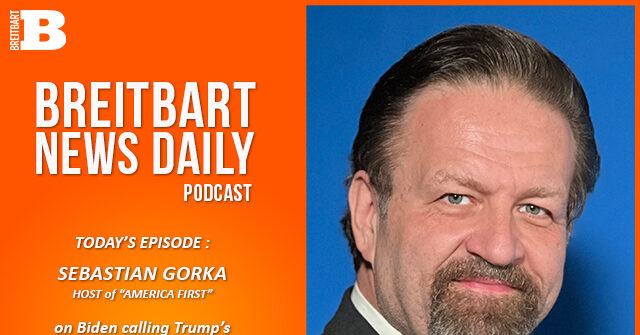In a recent episode of the Breitbart News Daily Podcast, host Mike Slater engages with Dr. Sebastian Gorka, a prominent political analyst and former strategist for President Trump, to discuss the ramifications of President Joe Biden’s derogatory remarks aimed at Trump supporters. Biden referred to a significant portion of the American populace, particularly those who support Trump, as “garbage.” This inflammatory language raises concerns about the deepening divisions within the United States, especially as the nation approaches the critical 2024 presidential election. Gorka emphasizes that such rhetoric can have serious implications not only for public sentiment but also for the political landscape.
Gorka argues that Biden’s comments are not mere slip-ups; they reflect a broader strategy that might alienate voters who identify with Trump. He posits that labeling a substantial segment of the country in such a negative light could galvanize Trump supporters and even encourage undecided voters to rally behind the former president. The rhetoric may serve to unify Trump’s base in the face of perceived attacks on their values and beliefs. Gorka believes that this could create a counterproductive dynamic for the Biden administration as they strive to appeal to a wider electorate.
As the 2024 election approaches, the stakes are high. Gorka suggests that the divisive language used by Biden may inadvertently energize Trump’s campaign, countering any narrative that positions the Democrats as the party of inclusion. He explains that elections are not just about policies but also the emotions and perceptions voters hold toward their candidates. The implications of Biden’s comments could further entrench existing partisan divisions, making it difficult for moderate voters to connect with the current administration’s message.
Moreover, Gorka touches on the evolving nature of political discourse in America. The increasing prevalence of hostile language towards political opponents can diminish the potential for constructive dialogue and cooperation. Such attacks may perpetuate feelings of resentment, leading to a more hostile environment that could hinder bipartisan initiatives. The challenge for leaders, in this context, is to find a way to communicate effectively across party lines without resorting to derogatory language and undermining trust in the political process as a whole.
Additionally, Gorka reflects on how this incident might influence the strategies employed by both the Trump campaign and the Biden administration as they enter the election cycle. The Trump campaign may need to capitalize on Biden’s remarks to portray themselves as defenders of everyday Americans against an elitist leadership that disrespects them. Meanwhile, Biden’s team might face the dilemma of either doubling down on their messaging or recalibrating their approach to address the backlash from voter segments offended by the President’s comments.
In closing, the discussion between Slater and Gorka highlights the increasingly polarized nature of American politics as the 2024 election draws near. Biden’s derogatory remarks have the potential not only to affect his relationship with Trump supporters but also to reshape the broader electoral landscape. Gorka underscores the importance of understanding the emotional resonances behind political rhetoric and cautions against underestimating the power of language to influence voter sentiment. With the political climate becoming ever more contentious, both sides must navigate these challenges carefully in the lead-up to the election.

